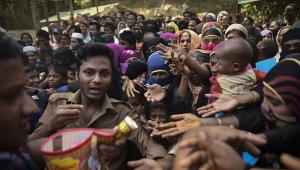A report by the House of Commons’ International Development Committee, published today, said the UK’s international aid spending on education has seen a “clear decline” since 2011 and remains much lower than aid to other areas, such as infrastructure and health.
It called on the Department for International Development to “give the full amount” to the Global Partnership for Education, the only multilateral fund for education, in the next funding round.
Committee chair Stephen Twigg said: “For some, the situation in global education is a crisis. To achieve this in education will require a substantial increase in finance, access and quality.”
He added: “DfID is recognised as a global leader in promoting education in developing countries and we urge them to champion the needs of the most marginalised children and young people across the world.”
The MPs’ report said, without an educated population, countries cannot progress out of poverty, as public health, skilled workforces, economic prosperity and civil society all benefit from sustained investment in education.
The International Commission for Global Education Opportunities has estimated a $1.8trn funding shortfall across middle and low-income countries compared to the resources needed to meet the sustainable development goal on education by 2030, the report said.
Twigg said: “With a policy refresh on global education underway at DFID, the committee is calling on the department to put the most marginalised children and young people at the heart of their work.
“The very poorest, disabled children, girls and those affected by conflict and emergencies, should not be left behind.
“The Committee supports the Department’s work to ensure maximum impact for their spending. Resources should be targeted at the foundations of development and the most marginalised groups. This should also be borne in mind for cross-government funds.”
The MPs called on the government to increase aid funding for education in a letter to the former international development secretary Priti Patel earlier this year.
The committee also called on DfID to invest more in the early years of education, as only 15% of children in low-income countries have access to pre-primary education compared to 82% in high-income countries.
Investment in early-years education accounts for just under 0.6% of the bilateral education budget, the report said.







